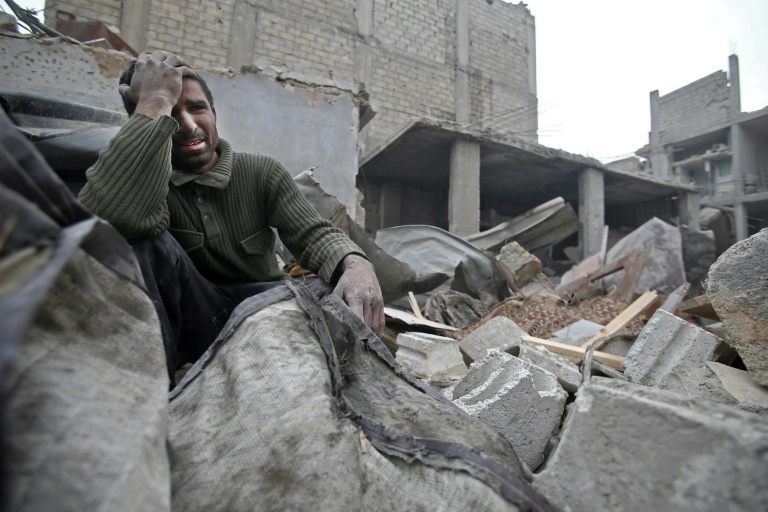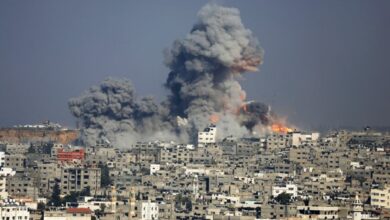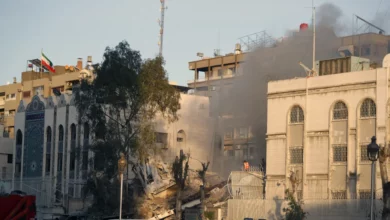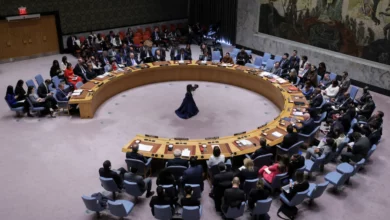
Fresh regime strikes on a besieged rebel-held enclave near Damascus killed 35 civilians on Tuesday despite mounting Western pressure on Syrian President Bashar al-Assad.
The bloodshed came a day after another 31 civilians were killed in Eastern Ghouta and as the United Nations pleaded for a truce in the seven-year-old conflict to allow for aid deliveries.
Fighting also raged in the northwestern province of Idlib, where the UN said the violence “made a mockery” of the de-escalation zones agreed last year in a bid to pave the way for an end to the war.
The latest casualties in Ghouta, on paper also a de-escalation zone, came as Washington threatened military action over the reported use of chemical weapons in the enclave, which regime and allied forces have besieged since 2013.
The death toll rose from an initial report of 16 “because the strikes are continuing — some new victims died in Douma and some critically wounded people died of their wounds,” the Syrian Observatory for Human Rights said.
Observatory chief Rami Abdel Rahman added that few rebels were among the dead because they rarely left their tunnels and had better protection from air strikes than civilians, estimated to number around 400,000 in Ghouta.
In apparent retaliation, rockets were fired on Damascus’s Bab al-Touma neighbourhood, killing three civilians, the state news agency SANA reported.
– Increase in violence –
Although less deadly, regime attacks involving suspected chlorine-filled munitions on Ghouta have also been on the up in recent weeks.
The US State Department said on Monday it had recorded six suspected chemical attacks in Syria in the past 30 days.
Washington, which last year launched cruise missiles on a regime airfield in retaliation for a nerve agent attack in Khan Sheikhun that killed scores of people, has threatened more military action.
France last month blacklisted companies and nationals it said had links to Syria’s alleged chemical programme.
US ambassador to the UN Nikki Haley clashed with her Russian counterpart at a meeting of the Security Council on Monday after proposing a statement condemning Damascus “in the strongest terms”.
Russia, Assad’s main backer, retorted that “no perpetrators have been identified” and accused the United States of orchestrating a “propaganda campaign” against the Syrian government.
The UN said it was looking into the reports of chemical attacks and condemned what it described as an escalation in violence in Ghouta and Idlib.
– Plea for aid truce –
“Over the last 48 hours, the scale and ferocity of attacks has increased dramatically,” the UN-mandated Independent International Commission of Inquiry said in a statement.
In Idlib, the last province in the country to largely escape government control, daily fighting is also claiming an growing human toll and displacing thousands.
The UN commission said at least three hospitals were hit in recent strikes and shelling.
“These reports are extremely troubling, and make a mockery of the so-called ‘de-escalation zones’ intended to protect civilians from such bombardment,” said Paulo Pinheiro, chair of the Commission.
After talks in Russia and Austria last month failed to yield a breakthrough, the UN’s humanitarian coordinator and top envoys in Syria issued a statement in Damascus Tuesday calling for a month-long truce.
The measure would “enable the delivery of humanitarian aid and services, evacuation of the critically sick and wounded, and alleviation of people’s suffering, to the extent possible, wherever they are,” the UN said.
The UN said existing agreements on the delivery of aid were not being honoured and stressed that “if access was granted, three convoys could be dispatched each week, reaching over 700,000 people in these areas in two months.”
While the fighting is abating in some parts of the country, the humanitarian crisis is still in full swing and aid groups predict a further 1.5 million people will be displaced in 2018.
There was no immediate comment from the regime or any of the other belligerents on the UN’s appeal.




